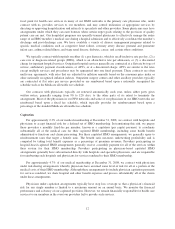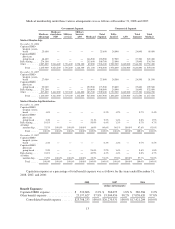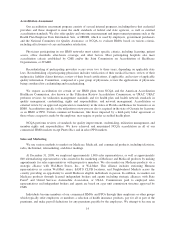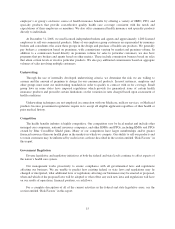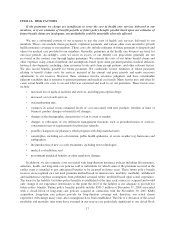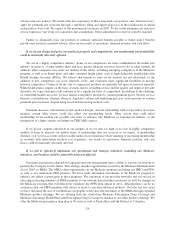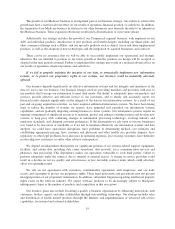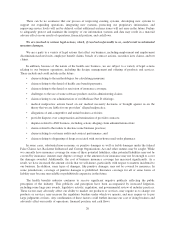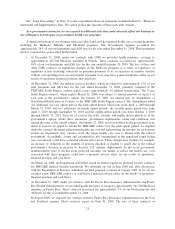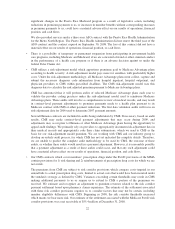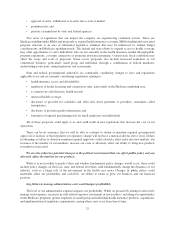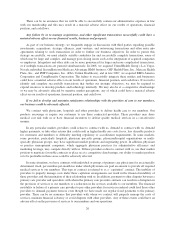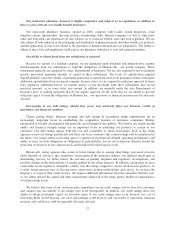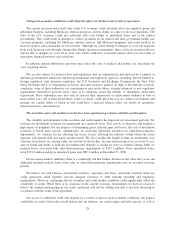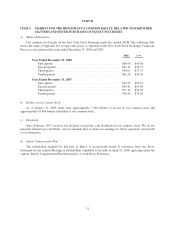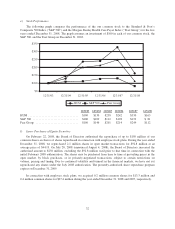Humana 2008 Annual Report Download - page 32
Download and view the complete annual report
Please find page 32 of the 2008 Humana annual report below. You can navigate through the pages in the report by either clicking on the pages listed below, or by using the keyword search tool below to find specific information within the annual report.significant changes in the Puerto Rico Medicaid program as a result of legislative action, including
reductions in premium payments to us, or increases in member benefits without corresponding increases
in premium payments to us, could have a material adverse effect on our results of operations, financial
position, and cash flows.
We also provided services under a three-year ASO contract with the Puerto Rico Health Administration
for the Metro North Region. The Puerto Rico Health Administration did not renew the third year of the
ASO contract and the contract expired on September 30, 2008. The loss of this contract did not have a
material effect on our results of operations, financial position, or cash flows.
• There is a possibility of temporary or permanent suspension from participating in government health
care programs, including Medicare and Medicaid, if we are convicted of fraud or other criminal conduct
in the performance of a health care program or if there is an adverse decision against us under the
federal False Claims Act.
• CMS utilizes a risk-adjustment model which apportions premiums paid to Medicare Advantage plans
according to health severity. A risk-adjustment model pays more for enrollees with predictably higher
costs. Under the risk-adjustment methodology, all Medicare Advantage plans must collect, capture and
submit the necessary diagnosis code information from hospital inpatient, hospital outpatient, and
physician providers to CMS within prescribed deadlines. The CMS risk-adjustment model uses this
diagnosis data to calculate the risk adjusted premium payment to Medicare Advantage plans.
CMS has announced that it will perform audits of selected Medicare Advantage plans each year to
validate the provider coding practices under the risk-adjustment model used to reimburse Medicare
Advantage plans. These audits will involve a comprehensive review of medical records, and may result
in contract-level payment adjustments to premium payments made to a health plan pursuant to its
Medicare contract with CMS or other payment reductions. The first data validation audits will focus on
risk-adjustment data for 2006 used to determine 2007 payment amounts.
Several Humana contracts are included in audits being undertaken by CMS. If necessary, based on audit
results, CMS may make contract-level payment adjustments that may occur during 2009, and
adjustments may occur prior to Humana or other Medicare Advantage plans having the opportunity to
appeal audit findings. We primarily rely on providers to appropriately document risk-adjustment data in
their medical records and appropriately code their claim submissions, which we send to CMS as the
basis for our risk-adjustment model premium. We are working with CMS and our industry group to
develop an orderly audit process, for which CMS has not yet indicated the complete details. Therefore,
we are unable to predict the complete audit methodology to be used by CMS, the outcome of these
audits, or whether these audits would result in a payment adjustment. However, it is reasonably possible
that a payment adjustment as a result of these audits could occur, and that any such adjustment could
have a material adverse effect on our results of operations, financial position, and cash flows.
• Our CMS contracts which cover members’ prescription drugs under the Part D provisions of the MMA
contain provisions for 1) risk sharing and 2) reimbursements of prescription drug costs for which we are
not at risk.
The premiums from CMS are subject to risk corridor provisions which compare costs targeted in our
annual bids to actual prescription drug costs, limited to actual costs that would have been incurred under
the standard coverage as defined by CMS. Variances exceeding certain thresholds may result in CMS
making additional payments to us or require us to refund to CMS a portion of the premiums we
received. We estimate and recognize an adjustment to premium revenues related to the risk corridor
payment settlement based upon pharmacy claims experience. The estimate of the settlement associated
with these risk corridor provisions requires us to consider factors that may not be certain, including
member eligibility differences with CMS. Beginning in 2008, the risk corridor thresholds increased
which means we bear more risk. Our estimate of the settlement associated with the Medicare Part D risk
corridor provisions was a net receivable of $55.4 million at December 31, 2008.
22


